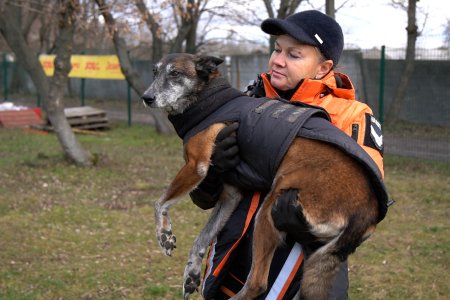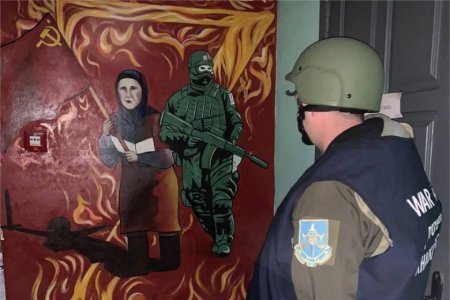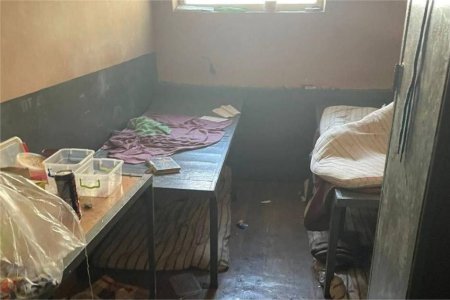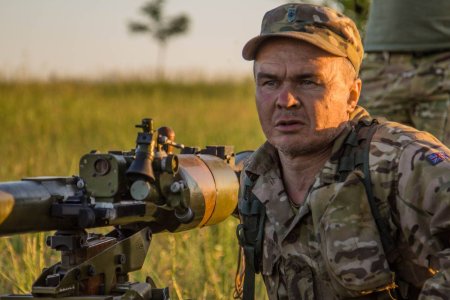I live alone. My son has a farm here, and we take care of it. We raised piglets and sold meat. When the Russian tanks came, everyone was at home. I was afraid even to go to the window. Something hummed and creaked. I heard a rattle from this side. It looked like an armored personnel carrier drove by, and the neighbor’s fence was broken. I finally looked outside, and there the tank tore out the door at the post office, and the soldiers were walking around. I went out into the street where they stood behind the fence, and in one voice, they said: “Forgive us, forgive us. We see that you live well here.” I nod: yes, we lived well until you came. They said — we were driving and saw your fields were sown. I said — yes! Our guys are fighting for every piece of land, and everyone is working. We want everything to be flourishing and beautiful here. Then their leader said: “And Kyiv is not far from you.” — “Yes, not far, 50 minutes away.”
Many people worked in Kyiv. Everyone worked, no one went hungry, and everything was in order with the children until you came! Now I don’t even know what will happen.
“They are talking about us...” — “What are they saying?!” — “They say, they say, we rape ...” —"There is no smoke without fire; there must be something.” They lowered their eyes and stood there. I am from the Perm Region, and they were from the Sverdlovsk division. My aunt lives there. However, we don’t communicate with anyone from there, not one! Before the war, we had little communication, and now even less. And then they asked for some water. I said go on, guys, climb over the fence. I have no water, but here is a water pump — go, take it, just don’t break anything, please. There was a table; they climbed over and got water. Russians also lived in the neighbor’s house, and there were many of them. At first, they were frightened as they were thrashed near Zalissia. One soldier said that there were less than half of them left. I said, guys, you should go home! You have nothing to do here.
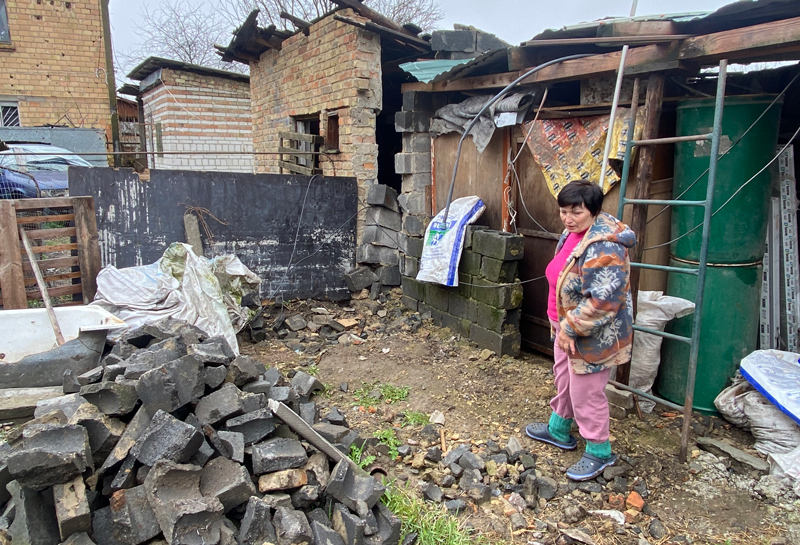
And then such shelling began here. I thought I could not stay in the house. I slept for a week on the inner steps of the house, away from the windows. Then I realized that I had to leave. My son and daughter-in-law lived with her grandmother. So I went there. My son came to check my house every day. He was not afraid, and he walked there. The Russians spoke to us normally. They offered to help us, but I answered that we didn’t need help, thanks. We can handle it ourselves.
I went out one day and saw the piglet lying shot, with the front and hind legs cut off and the remains left. It was terrible to see all this. Somewhere there was a hit that destroyed the barn. The three hundred kilograms sow was killed, and the piglets ran around. I thought it was time to leave. At first, we did not want to, as my grandson (from the youngest son) was three months old.
We were afraid because there were rumors that the columns were being shot, and many things could happen. So we stayed, and the shelling was strong.
People left: some left for Poland, and some were placed in Brovary. My daughter-in-law cried that there was an opportunity to leave, but we did not use it. I called my friend Halia from Shevchenkove. She said: “Maryna, go to the Katsaps [ethnic slur for Russians] and ask for permission to leave. There will be a column from Shevchenkove on the 20th at two o’clock.” I ran and asked them to help us leave because we needed to take the children out. They said not to worry; no one will touch you. Hang white ribbons on the car and go. Only go very slowly. If anyone approaches with a weapon, get out of the car and talk to them. Don’t resist, don’t fight, just ask. So I did. Roma [son] drove, and I went in front, holding a handkerchief. We went, and tanks were all around, but we turned the corner and moved slowly. We reached the neighbor’s house, and I heard something roaring.
The tank was moving fast! Roar! And it turned toward us... Roman was in the car. I stood in front of the tank and did not move.
It slowly turned around and drove in the other direction, and we continued. I saw two people with machine guns coming and went to them. I said I needed to take the children out. We need to pick them up near the school. — Come on, go ahead. Then I told them it looked like there was shelling. Please, I beg you to go first and warn these people we will be driving here. Please do not touch us. I spoke Russian with them. We started. I woke, and Roman drove. We arrived at the cafe, where quickly, in six seconds, we gathered everyone: the godmother, her daughter, our baby, and daughter-in-law. I took one small backpack, and that’s it. I kept walking with a white scarf, and they rode beside me. I read all the prayers, and my legs began to fail due to stress.
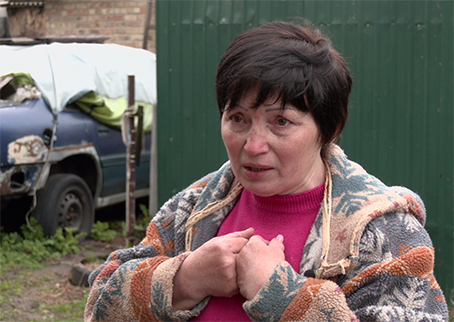
I got into the car and told my son to drive slowly as I walked. We reached the tractor park, and a dirty scarecrow with a machine gun crawled out. I went to him — this and that ... He said, wait, I’ll ask the commander. I started showing him my passport. — “Go.” We slowly reached the end of the village. I said, Roma, step on it a bit. We got to Shevchenkove, and they [Russians] were already roaming there. Tank or the armored personnel carrier went to Bobrik, to the station. A woman was talking to them. We stopped 20 meters away, and I ran to them. I said there must be a column, and we need to join it to leave. — “Some column left.” — “When? How long ago?” — “Well, two minutes or three.” Let’s go catch up with them. We caught up with them near Rudnya. At half past six or around five, we were already in Kyiv. We left on 20 March.
What did you do next?
The godmother lives in Kyiv, so we went to them. We stayed there, and two days later, we left for Western Ukraine. We were there for almost a week, and on 5 April, I returned home. We returned by hook or crook because we wanted to go home. We arrived, and here — a real horror: all the windows were broken, everything was damaged. A shell hit here, and brick fragments flew from our barn across the street.
What about your property?
The windows were broken. The tractor was slightly damaged. The barn was completely destroyed. Pigs escaped and ran around the village. We had about 80 pigs. There were about 50 left. Russians ate some, and some fled. The heads were lying around, a lot of skins. Here was their armored personnel carrier. Thanks to the kind people who helped, they put up new windows for me. The tractor has not yet been repaired, as there are no funds. They won’t build a new shed for us because it’s not in the property papers. Somehow we will restore it on our own. God Forbid they come here again. I pray to God and hope this doesn’t happen anymore.
What is this car?
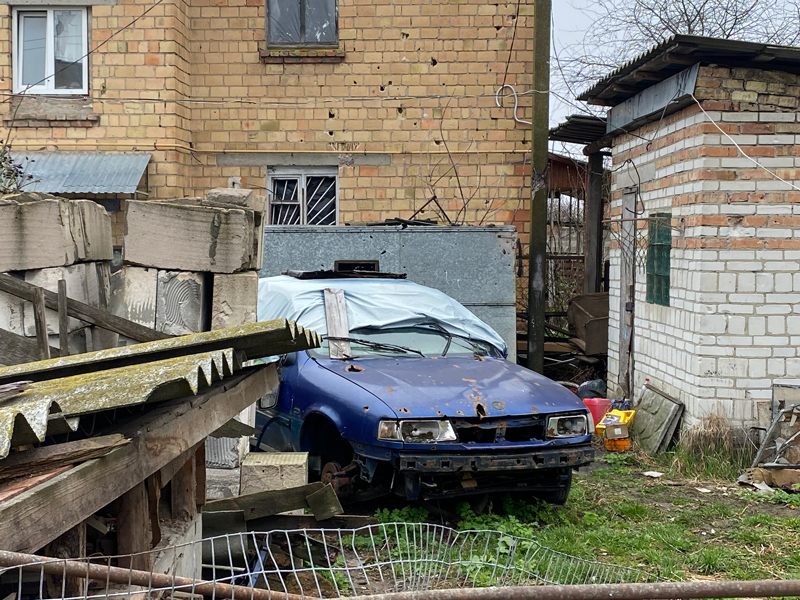
This is my neighbor’s car. There was shelling, and everything was scattered.
Was your neighbor here?
No. The neighbor left before they arrived. Over there, in the first apartment, there were children. They (Russians) asked me: “Do people live here?” I said: “Yes. And there are children everywhere, and a family with two small children in the first apartment. Children are everywhere, and people stay at home. We sit like mice.” However, they went there and said: “Get out of here; you are in our way.” As far as I know, people went to their parents on another street but were expelled from there and left for the sixteen-apartment [building]. We had some meat and lard, carried it to people, and distributed it.
Could you imagine that there would be a full-scale war?
No! I could not even think that we would have a war. We had to go to the market at five in the morning, and I heard — bang, bang! I didn’t understand anything, and then a neighbor called: “Maryna, the war has begun.” Roman didn’t believe it. He said: “Mommy, what are you thinking!” Either the father-in-law called, or he called him in Kyiv and said: “Come quickly, take Tania with the baby.” He went to Kyiv, picked up Tania and Tania’s sister Zhenia, and brought them to Grandma. We thought it would be safer here. The godmother also has arrived. We’ve all been here. I’m in my apartment, and they are at the godmother’s.
What happened next?
We heard a roar somewhere far away, in Zadvorychi. We heard cannonades but still lived an ordinary life. You know, anyone who has not had a shell fly over their head has no idea what it is. And now I know. When it passes, you fall to the floor and think the worst. I fell to the floor and prayed to God. It was terrible. I went to the center, to the pharmacy, where people stood in line, stocking up on medicines. I came home, sat down to drink tea, and saw people running. I thought there must be trouble! If people run, it’s a disaster. We already knew the Russians were coming, but they drove by us.
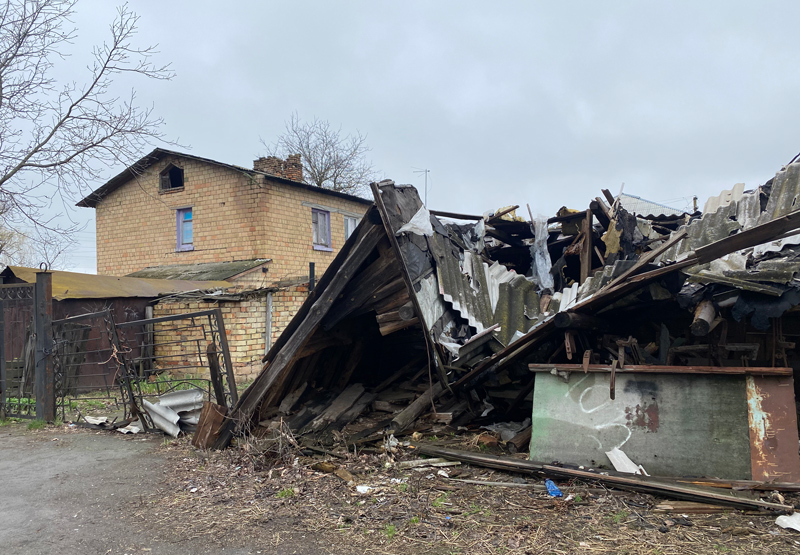
Nobody expected them to return to our Bohdanivka. But they got a good thrashing, and the fighting moved to us. They returned here in the evening. There was a tank behind the dormitory, the muzzle sticking out, and people were sitting in the basement there. It was some horror. And in the morning, the Russians began to rule the roost. They went to the post office, and they came to me. We must have been lucky. I heard that women were raped in the village, and houses were burned. The man was killed and a child. It’s terrible, but it all happened. They took away the son and husband from my relative, Valia. She was in Kyiv at work. They took them away, and it is still unknown where they are: neither alive nor dead, nowhere.
But I found the work history paper of her husband, Kolia. It was lying on the threshold near a neighbor’s apartment. I thought it was Natasha’s, the neighbor. I looked: Bobko Mykola Antonovych. I did not immediately understand who it was, but then I called Valia and told her that Kolia’s work history paper was there. His papers are still with me. Valia said, let them be with you. It’s so hard for her that she can’t even pick them up. There was one more case. A Russian guy was standing, and the cockade on his cap said, “Police”. I told him: “What is it you have?” — “I am a policeman!” And I’m thinking, they took a policeman here too, wasn’t his cockade? Where did he [Russian] get a cap?
What are your plans?
We are waiting for victory! We look forward to it and hope that it will be soon. I think everything will be fine with us. I only hope for the best. We will continue our small business, people will live, and Ukraine will prosper.
Has your attitude towards Russians changed?
I pray every day that God will give them sense so they return home and never intrude into foreign lands. Never! For this is a great sin. Our cities and villages have been raised to the ground! It’s horrible! You can not do it! Sometimes they say things that are incomprehensible to the mind. I recently watched one Russian woman whimpering: look, this is a cemetery, and there are so many graves here... These are the Wagnerites. Wagnerites? What about our children? What about our graves? Are they few? They are in our village, and in neighboring towns, and in Brovary. Are they Wagnerites graves? Here, small children are taken out from under the rubble. Our women give birth in basements, in unbearable conditions, while they shell maternity hospitals. Horror! I don’t know how they don’t understand it.
